Related Research Articles

Darwinism is a theory of biological evolution developed by the English naturalist Charles Darwin (1809–1882) and others, stating that all species of organisms arise and develop through the natural selection of small, inherited variations that increase the individual's ability to compete, survive, and reproduce. Also called Darwinian theory, it originally included the broad concepts of transmutation of species or of evolution which gained general scientific acceptance after Darwin published On the Origin of Species in 1859, including concepts which predated Darwin's theories. English biologist Thomas Henry Huxley coined the term Darwinism in April 1860.

Pierre Teilhard de Chardin was a French Jesuit priest, scientist, paleontologist, theologian, philosopher and teacher. He was Darwinian in outlook and the author of several influential theological and philosophical books.
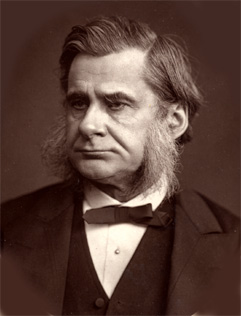
Thomas Henry Huxley was an English biologist and anthropologist specialising in comparative anatomy. He has become known as "Darwin's Bulldog" for his advocacy of Charles Darwin's theory of evolution.
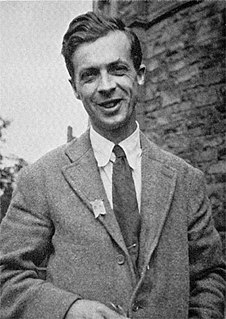
Sir Julian Sorell Huxley was an English evolutionary biologist, eugenicist, and internationalist. He was a proponent of natural selection, and a leading figure in the mid-twentieth century modern synthesis. He was secretary of the Zoological Society of London (1935–1942), the first Director of UNESCO, a founding member of the World Wildlife Fund, the president of the British Eugenics Society (1959-1962), and the first President of the British Humanist Association.
Australo-Melanesians is an outdated historical grouping of various people indigenous to Melanesia and Australia. Groups that were controversially included are found in parts of Southeast Asia, and South Asia.

Fordham University is a private Jesuit research university in New York City. Established in 1841 and named for the Fordham neighborhood of the Bronx in which its original campus is located, Fordham is the oldest Catholic and Jesuit university in the northeastern United States, and the third-oldest university in New York State.

Daniel Joseph Berrigan was an American Jesuit priest, anti-war activist, Christian pacifist, playwright, poet, and author.

Avery Robert Dulles was a Jesuit priest, theologian and cardinal of the Catholic Church. Dulles served on the faculty of Woodstock College from 1960 to 1974, of the Catholic University of America from 1974 to 1988, and as the Laurence J. McGinley Professor of Religion and Society at Fordham University from 1988 to 2008. He was an internationally-known author and lecturer.
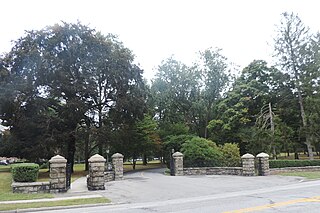
St. Joseph's Seminary and College, sometimes referred to as Dunwoodie after the Yonkers, New York neighborhood it is located in, is the major seminary of the Archdiocese of New York. Its primary mission is to form men for the priesthood in the Catholic Church. It educates men destined to serve within the Archdiocese and other archdioceses and dioceses both in the United States and abroad.
The Huxley family is a British family; several of its members have excelled in science, medicine, arts and literature. The family also includes members who occupied senior positions in the public service of the United Kingdom.
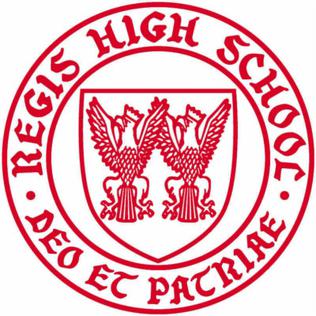
Regis High School is a private Jesuit secondary school for Roman Catholic boys located on the Upper East Side of Manhattan in New York City. In 2017, Regis was ranked as the top Catholic High School in the US by Town and Country Magazine. Regis was also ranked as the #1 Catholic High School in the US by niche.com in 2017, 2018, 2019, 2020, 2021, and 2022.
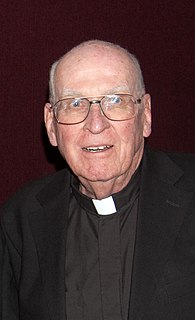
George Vincent Coyne, S.J. was an American Jesuit priest and astronomer who directed the Vatican Observatory and headed its research group at the University of Arizona from 1978 to 2006. From January 2012 until his death, he taught at Le Moyne College in Syracuse, New York. His career was dedicated to the reconciliation of theology and science, while his stance on scripture was absolute: "One thing the Bible is not," he said in 1994, "is a scientific textbook. Scripture is made up of myth, of poetry, of history. But it is simply not teaching science."
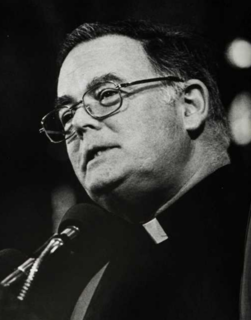
Timothy Stafford Healy was an American Catholic priest and Jesuit who straddled the religious and secular life, serving as the vice chancellor of the City University of New York, the president of Georgetown University, and the president of the New York Public Library.
Louis Gigante is a retired Catholic priest, former Bronx, New York City Council Member, the founder of the influential South East Bronx Community Organization (SEBCO), a Bronx community activist, and brother of two Genovese crime family members, family boss Vincent "The Chin" Gigante and top capo/acting boss Mario Gigante. He was the parish priest of U.S. Supreme Court Associate Justice Sonia Sotomayor when she was a teenager.
Mongoloid is an obsolete racial grouping of various people indigenous to large parts of Asia, the Americas, and some regions in Europe and Oceania. The term is derived from a now-disproven theory of biological race. In the past, other terms such as "Mongolian race", "yellow", "Asiatic" and "Oriental" have been used as synonyms.
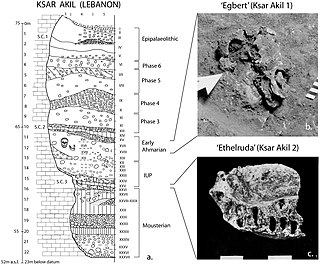
Ksar Akil is an archeological site 10 km (6.2 mi) northeast of Beirut in Lebanon. It is located about 800 m (2,600 ft) west of Antelias spring on the north bank of the northern tributary of the Wadi Antelias. It is a large rock shelter below a steep limestone cliff.
George Henry Guilfoyle was an American prelate of the Roman Catholic Church. He served as Bishop of Camden from 1968 to 1989.
Matthew Huxley was an epidemiologist and anthropologist, as well as an educator and author. His work ranged from promoting universal health care to establishing standards of care for nursing home patients and the mentally ill to investigating the question of what is a socially sanctionable drug.
Bryan Joseph McEntegart was an American prelate of the Roman Catholic Church. He served as bishop of the Diocese of Ogdensburg in Northern New York (1943–1953), rector of the Catholic University of America in Washington, D.C. (1953–1957), and as bishop of the Diocese of Brooklyn in New York City (1957–1968).
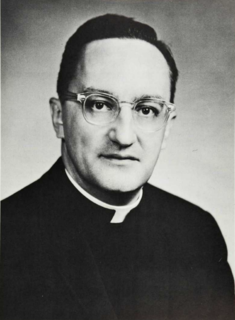
Gerard John Campbell was an American Catholic priest, Jesuit, and historian who became the president of Georgetown University. Born in Pennsylvania, he entered the Society of Jesus at the age of 20 and studied at West Baden College and Fordham University, before earning his doctorate at Princeton University. A promising historian, he then taught at Loyola University Maryland, before becoming the executive vice president of Georgetown University in 1963, where he effectively worked as acting president.
References
- 1 2 (21 May 1968). Rev. J. Franklin Ewing Is Dead; Fordham Staff Anthropologist, The New York Times , p. 47 (paywall)
- ↑ (29 November 1959). Priest-Scientist Disputes Huxley's View of Evolution, The Washington Star , p. 10 (noting that a speech by Ewing at a conference contrasted with that of Julian Huxley who also spoke)
- ↑ (8 January 1954). Jesuits Conclude 10-Year Study of Egbert's Skull, The Catholic Times, p. 10